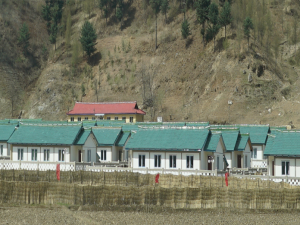With the North Korean authorities giving priority to the arms industry for electricity—supplying power for more than 18 hours each day—Daily NK has learned that ordinary households are frequently receiving only two hours of electricity a day.
“[The time] electricity is supplied has shortened further these days,” said a Yanggang Province-based source in a phone conversation with Daily NK on Feb. 12. “Yanggang Province receives electricity supply for six hours per day on average, but at worst, it [gets electricity for] less than two hours.”
This is no different from circumstances confronted by other areas, such as North and South Hamgyong provinces.
While North Korea, which relies heavily on hydroelectric power, generally provides less electricity in the winter season than the summer season, this year’s supply shortage has reportedly been more acute than usual.
North Korea’s electricity shortages are chronic problems that have continued for several decades. Nevertheless, the inequality in electricity allocation has worsened in the last few years, the source confirmed.
In a new version of the “The CIA World Factbook” released on Feb. 6, the CIA stated that 26% of North Korea’s population had access to electricity in 2019, with only 11% of the population in rural areas receiving electricity. Only 36% of North Korea’s urban population had access to electricity that year, according to the CIA.
Based on these figures, only one in four people in the country has access to electricity.
In fact, due to the recent decrease in the daily electricity supply and inconsistent supplies of electricity, North Koreans have frequently had days with “zero-electricity usage,” the source explained.

“To use electronic devices such as fridges, at least 12 hours of electricity needs to be supplied. Since that is not the case, powerful and wealthy officials are bribing power distribution stations to draw [more electricity into their houses],” the source said. “[With the current amount of supply, people are able] to use power to light lamps at the most.”
Even during the cold winter season, ordinary people are unable to run electric heaters, based on the source’s account.
Without power, electric appliances such as refrigerators or laundry machines in houses have been useless, he added.
According to the source, most people are drawing water from nearby rivers to do their laundry because they cannot clean their clothes with laundry machines or do not have access to regular supplies of tap water.
Acquiring water from a river, however, still presents challenges to people in the Sino-North Korean border area, as the ban on approaching buffer zones along the border, which has been enforced since last year to block the spread of coronavirus (COVID-19), continues to remain in effect.
In response to growing discontent from the people, the authorities have allowed people in areas near the border to approach a river at a set time so they can collect water for daily use.
Despite the current situation, the North Korean authorities called for an increase in the amount of electricity production while emphasizing the need to supply the arms industry with 18 hours of electricity per day.
During the Eighth Congress of the Workers’ Party, North Korean leader Kim Jong Un underscored his “people-centered” policies. In reality, however, North Korea is prioritizing the strengthening of national defense over people’s lives, according to the source’s account.
Upon hearing about Kim’s orders to prioritize the supply of electricity to the arms industry, the source criticized the deceptive nature of his government’s policies.
“If [one could take] three hours from 18 hours of electricity [reserved for] the arms industry and offer it to [ordinary] citizens, [people’s living conditions] might improve,” the source suggested, adding, “It is questionable whether [this policy truly] places the people first.”
During a recent meeting of the Central Committee from Feb. 8 to Feb. 11, Kim, in a rare admission to the country’s electricity shortages, said that “production in coal mines and mines are being suspended because they are not receiving [enough] electricity.”
















